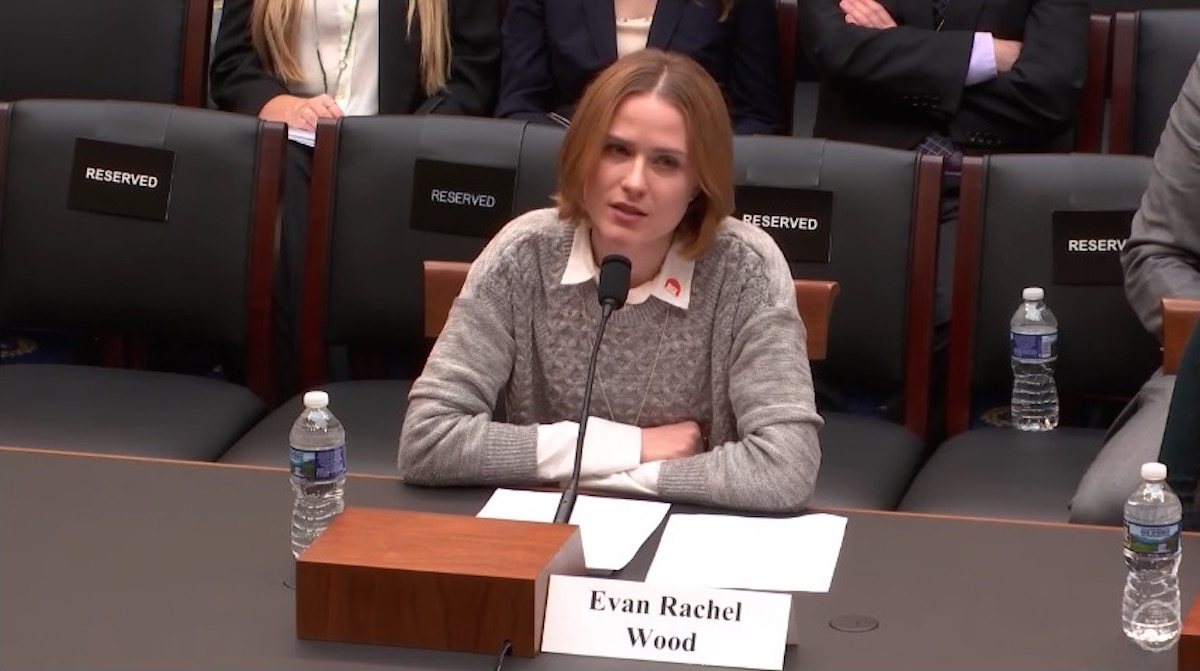“I Was Not Fine & I Am Not Fine”: Evan Rachel Wood Opens Up About Her History of Abuse in Support of the Sexual Assault Survivors’ Bill of Rights

‘I was not fine, I am not fine.’ — Actress Evan Rachel Wood gave a heartbreaking testimony about her own history of rape and abuse in support of the Sexual Assault Survivors’ Bill of Rights pic.twitter.com/UpVdi8pHIz
— NowThis (@nowthisnews) March 1, 2018
Evan Rachel Wood is in Washington this week along with other survivors of sexual abuse, providing testimony in support of expanding the Sexual Assault Survivors’ Bill of Rights Act to all 50 states. A Survivors’ Bill of Rights Act was passed in 2016 on a federal level (meaning it only applies to federal cases) and currently exists in nine states. It ensures that victims of sexual assault have access to free medical examination and the preservation of rape kits through the end of a case’s statute of limitations. It aims to overhaul the process of reporting assault and lessen the burden traditionally placed on survivors.
Wood spoke to the House Judiciary Committee Wednesday, along with Amanda Nguyen, the bill’s originator and chief executive of RISE, RISE’s Chief of Staff Lauren Libby, and RAINN president Rebecca O’Connor. Wood told the committee, “This bill is just one step in the right direction of setting the bar higher for what’s right and what the standard will be that we set for society.”
Wood opened up about her history with rape and abuse back in 2016, in an interview with Rolling Stone. For the most part, though, she has kept the details to herself. Back in October of last year, she released a video explaining why she, like so many other women, was choosing not to reveal the names of her abusers. In speaking to Congress, she still withheld names, but detailed her experiences in order to shine a light on what assault can look like from the inside and because, she says, she believes in the saying, “If we have to live through it, then you should have to hear it.”
Content warning for partner violence, sexual and emotional abuse.
“My experience with domestic violence was this,” she says. “Toxic mental, physical, and sexual abuse which started slow but escalated over time, including threats against my life, severe gaslighting and brainwashing, waking up to the man that claimed to love me raping what he believed to be my unconscious body. And the worst part, sick rituals of binding me up by my hands and feet to be mentally and physically tortured until my abuser felt I had proven my love for them.”
She goes on to say, “The aftermath of rape is a huge part of the conversation that needs much more attention, and in this case I can speak from my own experiences. So often we think of these assaults as no more than a few minutes of awfulness, But these scars last a lifetime.”
Wood says that even now, a decade later, she still struggles with the aftermath of her abuse. She speaks of her PTSD and her suicide attempts, and the ways in which her past trauma impairs her relationships with new partners. “In other words,” she says, “I was not fine, and I am not fine.”
Fortunately, her second suicide attempt landed her in a psychiatric hospital, which led her to get professional help and treatment. “But others are not so fortunate,” she says, “and because of this, rape is often more than a few minutes of trauma, but a slow death.”
This is why Wood and others are fighting for this bill, which would ideally lessen the burden and stigma of assault, and make it easier for survivors to cope with the aftermath.
“It’s the safety net that may help save someone’s life one day, and even though we passed this bill at a federal level, there is still work to be done. And in order to ensure that all survivors are protected under the law, we need to pass the Sexual Assault Survivors’ Bill in all 50 states. We’ve done this is nine so far and it’s our job to make sure that survivors in the other 41 are treated with the same humanity and dignity, and this is called progress, and it starts here.”
You can watch Wood’s testimony in the video above, and the full hearing here:
(image: screencap)
Want more stories like this? Become a subscriber and support the site!
—The Mary Sue has a strict comment policy that forbids, but is not limited to, personal insults toward anyone, hate speech, and trolling.—
Have a tip we should know? tips@themarysue.com